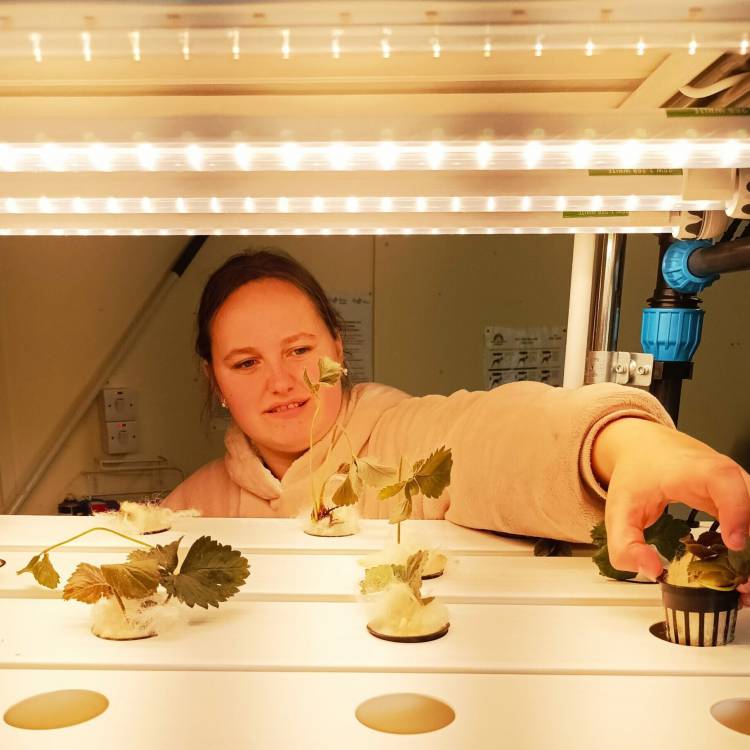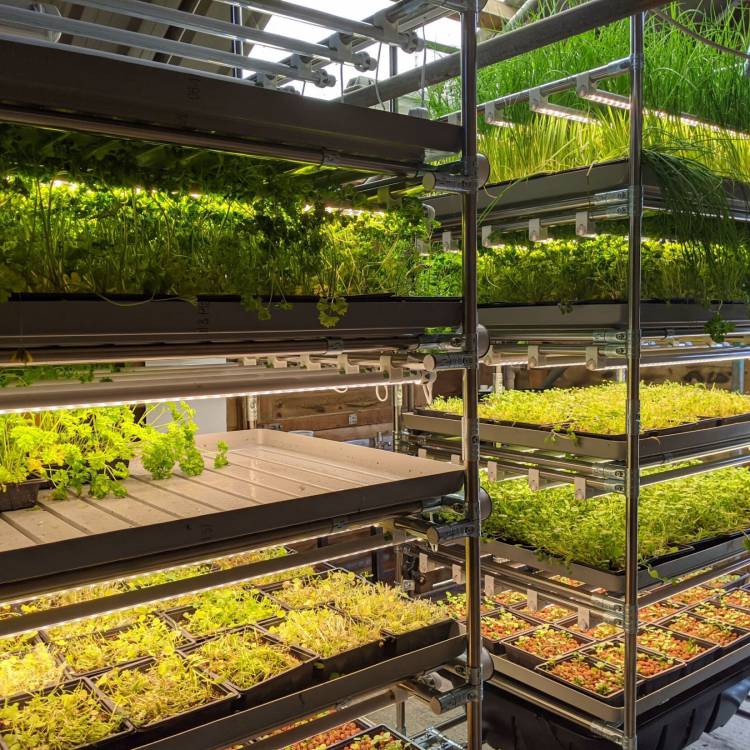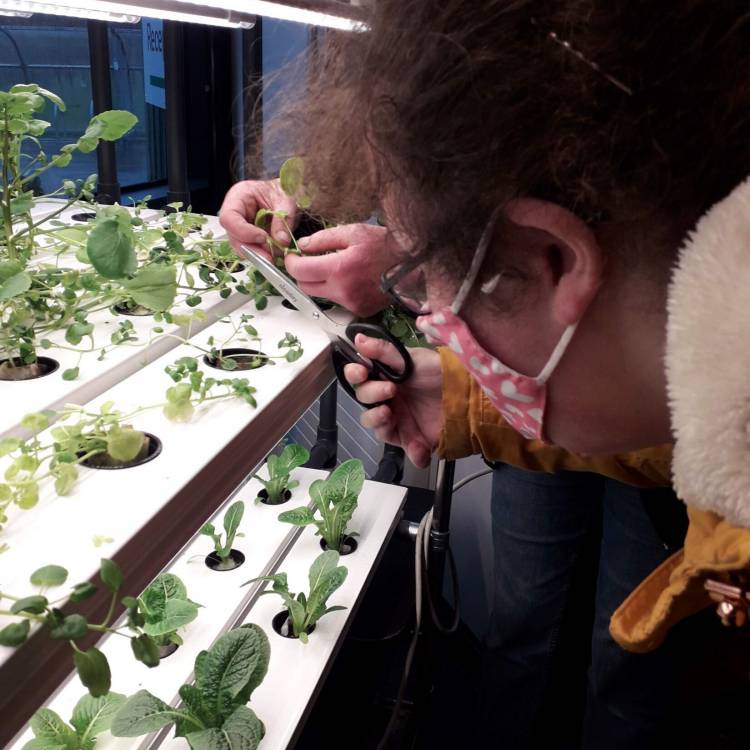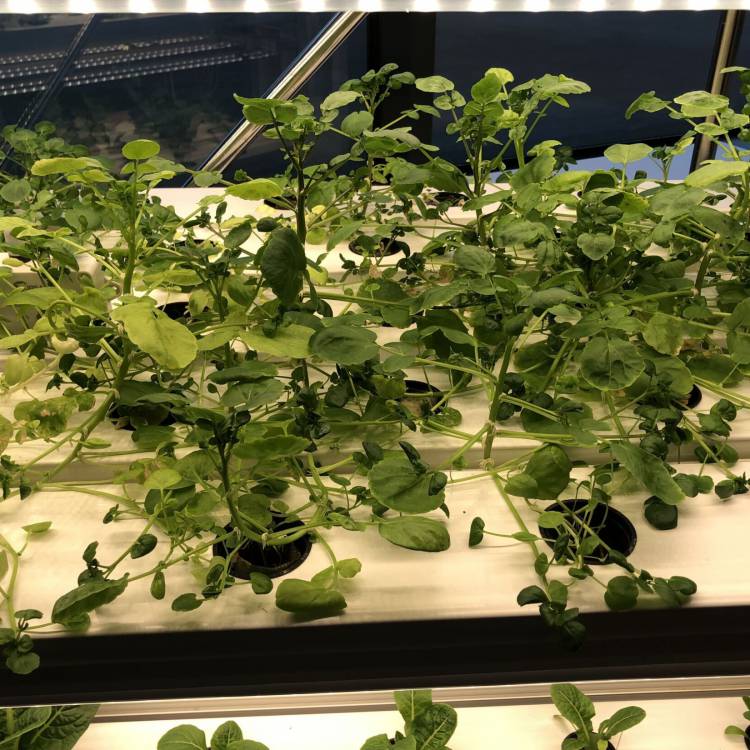Coleg Glynllifon to showcase benefits of cutting-edge crop growing
The land-based education college is hosting a workshop on hydroponics after students and staff trialled it as a greener and cost-effective method of food production
Farmers and growers are invited to a workshop at Coleg Glynllifon next month which will showcase the advantages of using hydroponics to grow fruit and vegetables.
Hydroponics is the science of growing plants without using soil, by feeding them on mineral nutrient salts dissolved in water.
Since 2020, students and staff from Coleg Glynllifon have been trialling a VF 5207 hydroponic unit, a stacked shelving system for growing crops using hydroponics.
During the trial period they have successfully grown 11 different crops - lettuce, watercress, coriander, parsley, nasturtiums (edible flowers), strawberries, pak choi, rocket, spinach, kale and Ethiopian kale.
The growing time to harvest varied from as little as 10 days for coriander, up to 30 days for spinach, kale and strawberries.
Coleg Glynllifon is set to share its learnings with growers and farmers in a one-day workshop, funded by Project HELIX, which is supported by the Welsh Government. The workshop will take place at the land-based education college on Tuesday, December 12.
The workshop aims to transfer the knowledge, skills and benefits learnt from the hydroponics trial to the agriculture, horticulture and food sector, in partnership with other field specialists who will also present at the workshop.
Topics for the day will include:
- Coleg Glynllifon and Hydroponics
- Technical aspects of growing fruit and vegetables using hydroponics
- Economic and marketing aspects for a viable and sustainable hydroponics enterprise.
- Food safety and packaging for hydroponic crops
- A visit to local commercial Hydroponic producer 'Fferm Cwm yr Wyddfa'
Any plant can be grown hydroponically but the method is most widely used to produce greenhouse crops such as lettuce, microgreens, herbs, tomatoes, cucumbers, spinach, peppers, and a range of different flowers.
One of the advantages of hydroponics is that plants can be grown anywhere - in a polytunnel, greenhouse, or in redundant farm buildings. Crops can also be grown all year round through the seasons, enabling improved control over growing conditions.
Other benefits include no weeding, a more efficient use of water and nutrients, no need for crop rotation, and ease of harvesting - all leading to an overall increased efficiency in crop production.
During the trial at Coleg Glynllifon, plants were grown indoors all year round at three different locations, without the need for heating or ventilation.
Labour requirements were found to be minimal at about three hours a week, regardless of the crop type grown.
Tasks included daily checks of the pH level and nutrients being made available within water-soluble nutrient mixture to the plants, checking for any pipe blockages, and checking plant growth and health.
Harvesting was easy, with most labour time required to clean the trays and the system thoroughly after each crop was harvested, with a half a day needed for cleaning and sterilisation of the hydroponics unit.
Rhodri Owen, the Farm, Forestry and Innovation Manager at Coleg Glynllifon, explained: “The hydroponics unit here is already giving good results. As it has a controlled environment there are many benefits, including improved production times and increased yield.”
Wyn Davies, Agricultural Advisor at Coleg Glynllifon, said: “For established horticulture and agriculture-food businesses, hydroponics can offer an ‘add-on’ enterprise and another source of income, as well as an opportunity to diversify with a new enterprise.
“Alternatively, hydroponics is suitable as a startup business for those with limited cultivable land.
“Hydroponics requires no land, only a room (an empty farm building, a garage or a spare room in the house) to grow the plants without soil.
“As fruit and vegetables can be grown all year round, it can provide a regular monthly cash income. The enterprise is also green, as plants use less water and nutrients to grow in a weed-free controlled environment, overcoming geographical factors such as altitude and weather conditions.
“Hydroponics technology potentially represents a more efficient production system and a viable method for growing fruit and vegetables without cultivable soil. The workshop will look at the key technical challenges, as well as the economic and marketing aspects to establishing a viable and sustainable hydroponics business.
“This will be done via classroom as well as practical demonstration and a field visit to a commercial hydroponics enterprise.”
The hydroponics trial at Coleg Glynllifon was part of the Menter Môn – Tech Tyfu project, funded by the Welsh Government’s Rural Development Fund.
If you are interested in attending the workshop on December 12, please register here.



